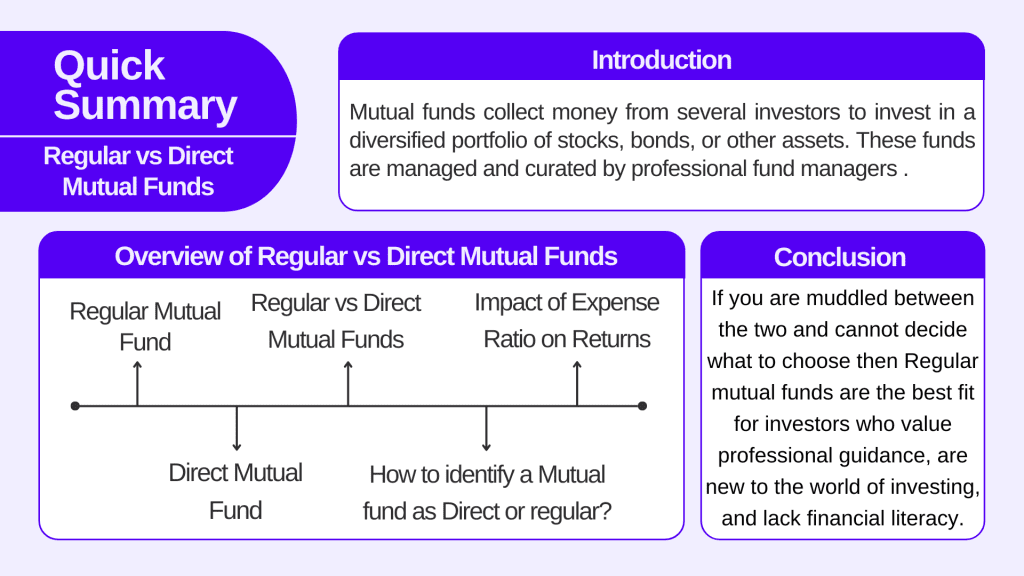| Type | Description | Contributor | Date |
|---|---|---|---|
| Post created | Pocketful Team | Jan-18-24 |

- Blog
- regular vs direct mutual funds make the right decision
Regular vs Direct Mutual Funds: Make The Right Investment Decision

As of December 2023, the Indian Mutual Fund Industry has over 50 lakh crores under management, and if your majority of the investments are in Mutual Funds, then it is high time that you should know the difference between Regular and Direct mutual funds.
What are Mutual Funds
Mutual funds collect money from several investors to invest in a diversified portfolio of stocks, bonds, or other assets. These funds are managed and curated by professional fund managers and hence become suitable for investors who have less time and expertise to manage their portfolios.
When you invest in mutual funds, NAV (Net asset Value) is allotted to you, which reflects the net value of the assets that are chosen by the fund manager to invest your money in. Furthermore, SIPs and lump-sum are different ways through which we can invest in mutual funds.

Benefits of Investing in Mutual Funds

- Mutual funds help you diversify your capital across asset classes. This spreads your risk and mitigates the impact of losses, if any, in a single holding.
- Mutual funds are managed by professional fund managers who understand market dynamics. These managers help you reduce the pressure of managing your portfolio.
- Investing in mutual funds is a hassle-free way to access a diversified portfolio. You do not need to keep an eye on every asset class, such as stocks, bonds, debentures, etc.
- Investment amounts for mutual funds are low as compared to directly buying stocks or bonds. You can start your investment journey today with an amount as low as INR 500.
- There’s a vast array of mutual funds available catering to diverse investment goals, risk appetites, and time horizons. You can choose the fund that best aligns with your objective.
Regular Mutual Funds
Every mutual fund scheme offers two ways to invest: Direct Route and Regular route. A regular mutual fund is a type of mutual fund that is sold through intermediaries such as brokers and distributors. Investment in mutual funds through regular mode attracts a higher TER* because of commission involved.
If you’re not familiar with the word TER, it stands for Total Expense Ratio, or say, Expense Ratio. Fund Managers charge an annual fee that is charged to investors basis their total investment and the same can be analysed through TER.
Did you know?
Every mutual fund in India comes under Regulation 52 of the SEBI MF Regulations, in which the maximum TER allowed is 2.5% for the first INR 100 crores of total net assets.
Here are some interesting features to know about regular mutual funds:
- Regular mutual funds carry a high expense ratio, i.e., a larger portion of your investment will be eaten up by fees, thereby reducing your returns.
- The expense ratio is the cost linked with managing and operating a mutual fund. It is expressed as a percentage of the fund’s average net assets and represents the total annual expenses charged to the fund.
- Regular mutual funds are a good investment option for investors who do not have enough time and knowledge to do their research on mutual funds, and are willing to pay a higher expense ratio and seek professional investment advice.
- Regular mutual funds are distributed through multiple channels such as, banks, SEBI-registered financial advisory firms, and brokerage firms.
Direct Mutual Funds
Investing in Direct mutual funds means buying directly from the Asset Management Company (AMC) without the involvement of any intermediaries like brokers or distributors. The investor invests through the website of the AMC, mobile app or offline. Further, there are certain new-age brokers as well which provide the facility of investing in direct plans.
Here are some interesting features to know about direct mutual funds:
- Since there are no distributors involved, direct plans have a low expense ratio.
- The lower expense ratio leads to a higher net asset value (NAV).
- The investor in direct mutual funds has more flexibility as compared to regular ones.
- Direct mutual funds are the best fit for individuals who understand the fundamental concept of mutual funds, prefer a do-it-yourself (DIY) approach, and are willing to do thorough research and analysis.
Regular Mutual Fund vs. Direct Mutual Fund
- Regular mutual funds are sold through intermediaries such as distributors and brokers, whereas direct mutual funds are bought directly from the asset management companies who manages the fund.
- Unlike direct mutual funds, regular mutual fund has a high expense ratio because of intermediaries. The regular mutual fund has a lower NAV because the distributor’s commission is deducted from the invested capital whereas direct mutual funds offer a high NAV for the same investment amount because of the low expense ratio.
- A higher expense ratio leads to lower returns in regular plans as compared to direct plans.
- Regular mutual fund often comes with professional advice (investment advisor), while direct funds are self-directed and DIYs.
Breakdown of Expenses
The fee structure of direct and regular mutual funds is more or less the same. Let us dive deeper to know the difference.
- Expense Ratio – As discussed above, this covers the fund’s operating costs such as management fees, custodian fees, and administrative expenses and is generally expressed as a percentage of the asset under management. The expense ratio for direct mutual funds is lower, and in the case of regular mutual funds expense ratio is generally higher due to the inclusion of distribution charges.
- Transaction charges – Some of the direct or regular mutual funds may charge a small amount for buying or selling mutual fund units.
How to identify a Mutual fund as Direct or regular?

Suppose you want to invest in a mutual fund scheme but want to avoid seeking professional advice. Then how will you recognize whether the fund you have chosen is direct or regular? We got you covered!
- The word ‘direct’ will be there in the name of the scheme.
- The expense ratio of a direct scheme will always be lower than that of a regular scheme.
- You can also refer to your consolidated account statement. If the plan is direct, no ARN* number will be mentioned in the account statement.
*ARN Number is the AMFI registration number issued to the mutual fund distributors and brokers.
Impact of Expense Ratio on Returns

Let’s understand this with an easy example:
- Initial Investment – INR 1 lakh
- Time Period – 20 years
- Rate of Return – 15%
- Expense Ratio – 2.5% in regular plan and 1.5% in direct plan
After 20 years, your investment:
In Direct Plan– INR 12.58 lakhs
In Regular Plan – INR 10.54 lakhs
That’s a difference of almost INR 2 lakhs, so now you can get an idea of how the difference of just 1% can significantly impact your returns over a long period.
Conclusion
If you are muddled between the two and cannot decide what to choose then Regular mutual funds are the best fit for investors who value professional guidance, are new to the world of investing, and lack financial literacy.
Direct mutual funds can be a match for investors whose primary focus is to maximise the returns and who are cost-conscious. They are experienced investors who are comfortable with independent research and decision-making and are well-versed in managing investments directly.
Eventually, the choice depends on the individual preferences and their financial goals. However, we would suggest seeking professional advice if you are not sure which fund aligns perfectly with your investment objective.
Frequently Asked Questions (FAQs)
What is the difference between direct and regular mutual funds?
Direct mutual funds are bought directly from the AMC, whereas regular funds are bought through intermediaries like brokers and distributors.
Which is better: Direct or Regular Mutual funds?
The answer to this question depends on the individual’s needs and preferences. However, direct funds come with a lower expense ratio and provide better returns than regular mutual funds.
Can I change my investment plan from a regular to a direct mutual fund?
Yes, you can change your investment plan from a regular to a direct plan by contacting the asset management company. However, there are certain things which investors should keep in mind before switching from a regular to a direct plan:The change in investment plan will be treated as a withdrawal, which means if there is any exit load, then you have to incur exit load charges if you redeem your investment before the exit load period. Further, there are tax consequences depending on the type of fund and time horizon.
Which one gives higher returns?
Generally, direct funds have a lower expense ratio as compared to regular funds because there is no intermediary involved in direct mutual funds. Therefore, effectively, direct funds provide better returns than regular funds.
How to know the expense ratio of regular and direct plans of the same scheme?
You can know the expense ratio from the factsheet of mutual funds, which is available on the website of the Asset management company.
Disclaimer
The securities, funds, and strategies discussed in this blog are provided for informational purposes only. They do not represent endorsements or recommendations. Investors should conduct their own research and seek professional advice before making any investment decisions.